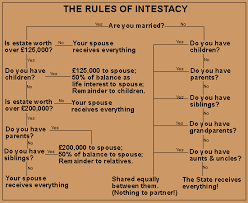
记忆方法
将“intestate”分解为“in”+“testate”。联想记忆:没有(in)留下遗嘱(testate),即指在某人去世时没有立下遗嘱的状态。这样通过构词法的联想可以帮助记忆这个单词的含义。
以上内容由AI生成, 仅供参考和借鉴
中文词源
intestate 未留遗嘱的
in-,不,非,-test,见证,遗嘱,词源同attest,testament.
英语词源
- intestate
-
intestate: see testament
- intestate (adj.)
- late 14c., from Old French intestat (13c.) and directly from Latin intestatus "having made no will," from in- "not" (see in- (1)) + testatus, past participle of testari "make a will, bear witness" (see testament). As a noun, "one who has not made out a will," from 1650s.
权威例句
- 1. I know he did not leave any valid WILL because He died intestate.
- 我知道他没有留下任何合法的意志因为他死了没有留下遗嘱.
- 2. The administrator will need to refer to legislation covering administration of intestate estates.
- 遗产管理人需要求助于有关无遗嘱遗产管理的立法.
- 3. The thesis analyses the tendency in correlative aspects of testamental succession and intestate succession.
- 从遗嘱继承制度和无遗嘱继承制度的相关方面可了解这一变迁.
- 4. When someone dies intestate, the property automatically go to the survive partner unless there are children.
- 当某人无遗嘱死亡, 财产自动归幸存的伴侣,除非他还有孩子.